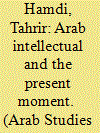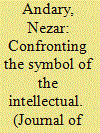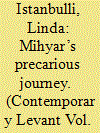| Srl | Item |
| 1 |
ID:
164743


|
|
|
|
|
| Summary/Abstract |
The Iraqi poet Saadi Youssef urgently asks, “Why are the poets silent?/Where have they gone?” These questions underscore the compelling need for the guiding voices of Arab intellectuals at this deeply divided present moment in the Arab world that has effectively seen the destruction of seemingly stable nations and identities. It is important to understand why and how easily “things fell apart” for Arab nations and peoples under the destructive influence and direct intervention of imperialist and Zionist agendas and forces. What does it mean to speak truth to power in the current Arab and global context where the destruction of Arab nations, such as Iraq, Syria, Libya, and Yemen has become the all too familiar, convenient, and accepted status quo, which is marked by destructive and exclusionary discourses? It has become incumbent upon the Arab intellectual/writer/poet to lead the self-examination process in order to provide an understanding of the current Arab situation within its greater global context and construct a revolutionary and insurrectionary oppositional discourse that would expose and dismantle the current defeatist and divisionary discourses. Antonio Gramsci's concepts of hegemony and consent, Louis Althusser's ideological state apparatuses, and Edward Said's important ideas on the intellectual's critical consciousness, secular criticism, and beginnings are the theoretical lenses used to help decipher the catastrophic happenings in the Arab world. This study also examines excerpts of literary works by important Arab poets/intellectuals, such as Mahmoud Darwish, Mourid Barghouti, Bader Shaker Al-Sayyab, Saadi Youssef, and Yusuf Al-Ani.
|
|
|
|
|
|
|
|
|
|
|
|
|
|
|
|
| 2 |
ID:
151301


|
|
|
| 3 |
ID:
184733


|
|
|
|
|
| Summary/Abstract |
This article investigates the representations of the literary persona of Mihyar in three works by Syrian authors. First established as a central figure in Arab literary culture by Adonis in his influential 1961 poetry collection The Songs of Mihyar of Damascus, Mihyar embodies the worldviews of the progressive intellectual of the 1950s and 1960s. As it examines Adonis’s Mihyar as well as his ensuing remobilisation in Haydar Haydar’s Banquet for Seaweed (1983) and Rosa Yasin Hasan’s First Draft (2011), this article calls attention to the implications of their literary re-makings in relation to fluctuating cultural and political conditions. I argue that both Adonis and Haydar assume the persona of Mihyar to model their idealised version of the public intellectual in their own image, whereas Hasan incorporates the figure of Mihyar into her novel to dismantle him entirely. By so doing, First Draft interrogates the totalising models of sovereign paternalism that a previous generation of intellectuals had produced and the genealogy they had constructed for Arab modernity. Hasan’s work speaks to the preoccupations of a new generation of Syrian writers who share an overwhelming sense of disillusionment with both the grand narratives that had governed the cultural field and the epistemological frameworks that had given rise to these narratives.
|
|
|
|
|
|
|
|
|
|
|
|
|
|
|
|
| 4 |
ID:
139131


|
|
|
|
|
| Summary/Abstract |
The renowned Egyptian journalist and commentator Mohamed Hassanein Heikal (b. 1923) is arguably the doyen of Arab writers critical of the United States. Heikal's career as an author spans more than half a century and his access to regional and international audiences has been greatly enhanced in recent years by his regular appearances on the al-Jazeera television station. Drawing on Heikal's extensive published work, this paper offers a detailed treatment of his views on US politics, society and especially foreign policy in order to highlight the elements constituting the image of the United States that he projects. The article argues that Heikal’'s critical representation of the United States has been central to the discourse of Arab nationalists since the late 1950s and their reconstruction of Arab nationalist ideology along anti-American lines. It further argues that Arab nationalists and Islamists subscribe to essentially the same critical reading of the United States and its foreign policy, especially towards the Middle East. Because intellectuals help shape public opinion, this convergence of views between nationalists and Islamists represents a principal source of the negative image of the United States among Arab publics. Understanding the discourse of Arab intellectuals is thus instrumental for comprehending Arab views of the United States. The Arab Spring, with its tribulations and promises of change, brings an urgent need to properly understand and contextualize the discourse of Arab intellectuals, both nationalists and Islamists.
|
|
|
|
|
|
|
|
|
|
|
|
|
|
|
|